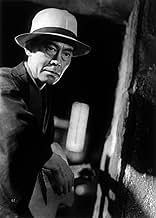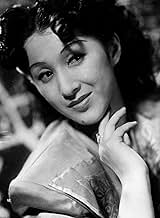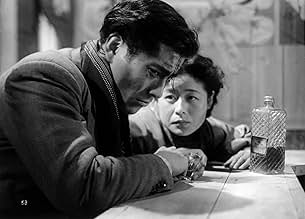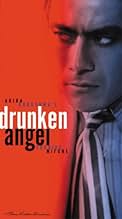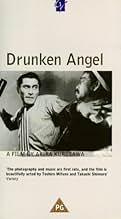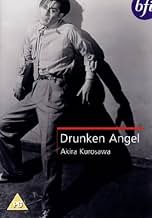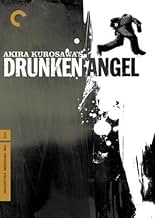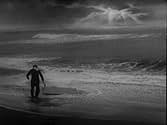A drunken doctor with a hot temper and a violence-prone gangster with tuberculosis form a quicksilver bond.A drunken doctor with a hot temper and a violence-prone gangster with tuberculosis form a quicksilver bond.A drunken doctor with a hot temper and a violence-prone gangster with tuberculosis form a quicksilver bond.
- Director
- Writers
- Stars
- Awards
- 4 wins total
Mayuri Mokushô
- Daughter at Flower Shop
- (as Kumiko Mokushô)
- Director
- Writers
- All cast & crew
- Production, box office & more at IMDbPro
7.614.4K
1
2
3
4
5
6
7
8
9
10
Featured reviews
A strong reflection of the morals of man
A very, very vivid film from Japanese legend, Akira Kurosawa. The Japanese town that is the setting for "Drunken Angel" is vividly captured by Kurosawa, and the filthy swamp that separates the doctor from the filthiness of the town is brilliant. Toshiro Mifune plays a tuberculosis stricken gangster who is slowly won over, despite his vicious pride, by the caring but sarcastic doctor. The swamp is a reflection of the corruption in the town and in one of the first scenes a group of children are seen playing in it. Kurosawa's way of foreshadowing these children's future since the town is controlled by the immoral gangsters. With the arrival of Okadu, a released convict and gangster, and struggles with his health, Mifune struggles through conflicts of soul which are brilliantly metaphored by Kurosawa. A great drama with some brilliant commentary about post-WW2 Japan. Solid characters carry with film about typical with the Doctor being an unforgettable creation and Toshiro Mifune giving a powerful performance.
In my top ten favorites of Kurosawa; under-rated (or maybe under-seen)
Considering this is the first collaboration between one of the 'heavyweight' director/star combos in cinema (tops in the Japanese film world, probably their equal to America's Scorsese/De Niro), this is quite a powerhouse of drama. That's not to say it's a completely dour film- some of Akira Kurosawa's trademark ironic (and subtle) humor is laced into scenes. But more-over, Kurosawa made here an important film for its time. While the team of Kurosawa and Toshiro Mifune would become even more internationally known for the thrilling Japanese mystery Stray Dog, and the masterpiece Rashomon, this film seems to get a little under-looked by Kurosawa fans (at least those that haven't quite dug into the catalog of their work). Is it their very best? Not quite, but it ranks high up there for me.
And it's not just the collaboration of the director and the star- there is also the co-star, Takashi Shimura, who has made his great mark on many of Kurosawa's films (the two I mentioned previous, plus his best role in Ikiru, and Seven Samurai as well). He plays a doctor who can't quite lay off the booze, even as he tries to help the people around him who seem to be contracting all sorts of bad diseases from the contaminated water (most notably tuberculosis). Mifune plays a member of the Yakuza crime gang, but is more of just a low level thug than a real 'somebody'. He's getting signs of TB, and goes to the 'good' doctor, who refuses help to the Yakuza, having outright contempt for them. Through the course of the film, The two actors portray these people as fragile, intense, hostile, compassionate, and with all the great emotional impact that comes in Japanese dramas.
While one might want to check this out for the context of the Yakuza part of the plot (which was one reason I wanted to check it out- not the Yakuza in today's Japanese cinema of course), the side that Kurosawa shows wonderfully in a film like Red Beard is also brought to light here. There's some action, but it gets thrown into a larger, more emotional context as Mifune's character starts to deteriorate. It becomes very theatrical in a sense, but there is also the realism that Kurosawa had on his sleeve, one that he had to express in post-war Japan (many of these post-war images are better expressed in Stray Dog, but he gives some ample time here too in a subtler, more dangerous context). So this mix comes together, and it turns into one hell of a picture. It may feel a little on the weak side compared to some of Kurosawa's magnum opuses (Seven Samurai, Ran, Yojimbo come to mind). Yet it ranks as an important point in the careers of the actors and director, and it contains enough great moments, enough in terms of the position of the camera and the often shattering music, to make it an under-rated (perhaps minor) classic. Personally, I loved it- especially the last twenty minutes.
And it's not just the collaboration of the director and the star- there is also the co-star, Takashi Shimura, who has made his great mark on many of Kurosawa's films (the two I mentioned previous, plus his best role in Ikiru, and Seven Samurai as well). He plays a doctor who can't quite lay off the booze, even as he tries to help the people around him who seem to be contracting all sorts of bad diseases from the contaminated water (most notably tuberculosis). Mifune plays a member of the Yakuza crime gang, but is more of just a low level thug than a real 'somebody'. He's getting signs of TB, and goes to the 'good' doctor, who refuses help to the Yakuza, having outright contempt for them. Through the course of the film, The two actors portray these people as fragile, intense, hostile, compassionate, and with all the great emotional impact that comes in Japanese dramas.
While one might want to check this out for the context of the Yakuza part of the plot (which was one reason I wanted to check it out- not the Yakuza in today's Japanese cinema of course), the side that Kurosawa shows wonderfully in a film like Red Beard is also brought to light here. There's some action, but it gets thrown into a larger, more emotional context as Mifune's character starts to deteriorate. It becomes very theatrical in a sense, but there is also the realism that Kurosawa had on his sleeve, one that he had to express in post-war Japan (many of these post-war images are better expressed in Stray Dog, but he gives some ample time here too in a subtler, more dangerous context). So this mix comes together, and it turns into one hell of a picture. It may feel a little on the weak side compared to some of Kurosawa's magnum opuses (Seven Samurai, Ran, Yojimbo come to mind). Yet it ranks as an important point in the careers of the actors and director, and it contains enough great moments, enough in terms of the position of the camera and the often shattering music, to make it an under-rated (perhaps minor) classic. Personally, I loved it- especially the last twenty minutes.
10Alan-57
Another classic from arguably the greatest filmmaker of all time.
Drunken Angel is another classic from arguably the greatest filmmaker of all-time. The story revolves around a petty gangster (Toshiro Mifune), who contracts TB and the Doctor (Takashi Shimura) who attempts to treat him despite the gangster's foolish pride. Mifune and Shimura, Kurosawa regulars, are brilliant in their respective roles. Kurosawa takes on film noir as well as any auteurs of his time. This is a must see for Kurosawa fans.
Simple tale underpinned by fantastic performances
DRUNKEN ANGEL sees the master of Japanese cinema, Akira Kurosawa, on solid form in the simplistic tale of the developing friendship between an alcoholic doctor and a dying gangster who comes to him for help. While the story is set very noticeably in a poor, run-down, post-WW2 Japan, the story is one which brims with life and vitality, which is somewhat ironic given the subject matter.
The calibre of the acting is second to none which is no surprise for fans of the director. Takashi Shimura underpins the whole thing as the titular character, a stressed-out doctor battling the bottle as well as the problems of his various associates and patients, but it's Toshiro Mifune who gives the stand-out turn here. This was the star's first collaboration with Kurosawa and it comes as no surprise that the pair would go on to re-team many times in the future. Mifune's performance as the small-fry gangster, addicted to drinking and partying and yet suffering from the effects of tuberculosis, is one of his greats.
Kurosawa's cinematography is another winner here, and there are some fine moments of tension including a great, extended fight scene at the climax. My favourite moment is a bizarre dream sequence in which Mifune is chased along a beach by a corpse only to find himself trapped in a slow motion run. It's one of the few times that the director went for outright horror (along with THRONE OF BLOOD) and it makes me wish he had made an all-out horror film at least once in his career.
The calibre of the acting is second to none which is no surprise for fans of the director. Takashi Shimura underpins the whole thing as the titular character, a stressed-out doctor battling the bottle as well as the problems of his various associates and patients, but it's Toshiro Mifune who gives the stand-out turn here. This was the star's first collaboration with Kurosawa and it comes as no surprise that the pair would go on to re-team many times in the future. Mifune's performance as the small-fry gangster, addicted to drinking and partying and yet suffering from the effects of tuberculosis, is one of his greats.
Kurosawa's cinematography is another winner here, and there are some fine moments of tension including a great, extended fight scene at the climax. My favourite moment is a bizarre dream sequence in which Mifune is chased along a beach by a corpse only to find himself trapped in a slow motion run. It's one of the few times that the director went for outright horror (along with THRONE OF BLOOD) and it makes me wish he had made an all-out horror film at least once in his career.
Yoidore tenshi: Best Toho film I've seen thus far
Drunken Angel returns Toho to their bleak, dark roots and on this occasion it certainly worked no end.
It tells the story of the tremulous relationship between an alcoholic doctor and his violent mafia member patient. The doctor see's his younger self in the Yakuza and set's about going the extra mile to help him despite being fought every stage along the way.
After a series of mediocre Toho films I was already losing faith in the Kurosawa hype, therefore this came as a really pleasant surprise to me.
Powerful, hard hitting and wonderfully constructed Drunken Angel is by far the best Toho movie I've seen thus far.
The Good:
Well written
Some poignant moments
The Bad:
Things I Learnt From This Movie:
Bullets come out of a persons body in the same condition they went in
I'd have let them get typhus......and that's reason no.57579853789 why I should never have kids
It tells the story of the tremulous relationship between an alcoholic doctor and his violent mafia member patient. The doctor see's his younger self in the Yakuza and set's about going the extra mile to help him despite being fought every stage along the way.
After a series of mediocre Toho films I was already losing faith in the Kurosawa hype, therefore this came as a really pleasant surprise to me.
Powerful, hard hitting and wonderfully constructed Drunken Angel is by far the best Toho movie I've seen thus far.
The Good:
Well written
Some poignant moments
The Bad:
Things I Learnt From This Movie:
Bullets come out of a persons body in the same condition they went in
I'd have let them get typhus......and that's reason no.57579853789 why I should never have kids
Did you know
- TriviaIn early drafts of the script, the story was almost entirely about Doctor Sanada (Takashi Shimura) and Matsunaga the thug (Toshirô Mifune) was a small supporting part. However, Akira Kurosawa was so impressed with Mifune's performance that he greatly increased the Matsunaga part, to the point where the Doctor and Matsunaga are almost equal in screen-time.
- GoofsEven though the story takes place during the hot summer, breath can be seen coming from characters in several scenes.
- Quotes
Dr. Sanada: The Japanese love to sacrifice themselves for stupid things.
- ConnectionsFeatured in Kurosawa and the Censors (2007)
- How long is Drunken Angel?Powered by Alexa
Details
- Release date
- Country of origin
- Language
- Also known as
- Pijani andjeo
- Filming locations
- Toho Studios, Tokyo, Japan(Studio)
- Production company
- See more company credits at IMDbPro
Box office
- Gross US & Canada
- $46,808
- Opening weekend US & Canada
- $15,942
- Jul 28, 2002
- Gross worldwide
- $47,023
- Runtime
- 1h 42m(102 min)
- Color
- Aspect ratio
- 1.37 : 1
Contribute to this page
Suggest an edit or add missing content

